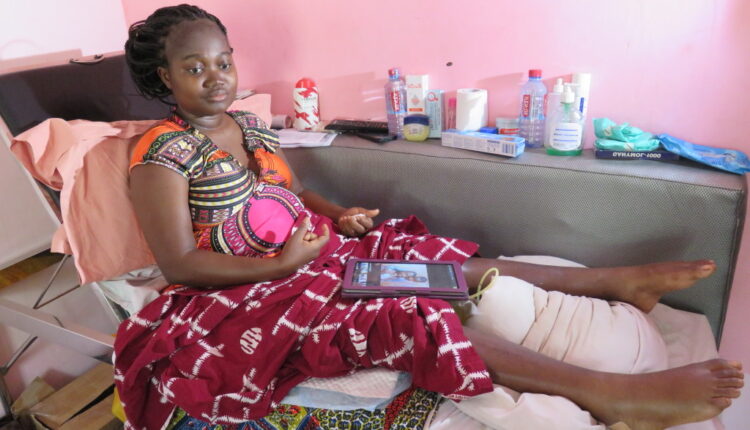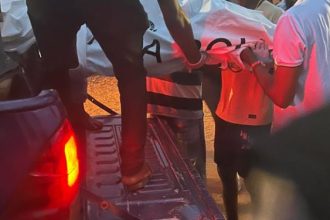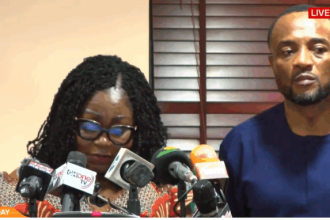An Accra High Court has dismissed an application for submission of no case filed by a husband accused of shooting his seven-month pregnant wife in the chest in August 2015.
The court believed that the prosecution had established a prima facie case against the accused person, Effort Dankwa.
The court presided by Justice Mary M.E. Nsenkyire has since ordered the former teacher of Angels International School Effort Dankwa to adequately prepare and open his defence for the attempted murder trial to continue.
The legal team for the accused person led by James Anum had filed the submission of no case after prosecution led by Madam Joyce Debrah on June 28 ended its case after calling 10 witnesses, including the victim Benita Dankwa.
Defence lawyers said although witnesses had been called to testify, the state had failed to prove that the accused committed the offence for which he has been charged.
But the judge disagreed.
The issue to be tackled was to find out if harm was caused, if the harm was lawful or unlawful, if the harm was caused by no other person than Effort Dankwa, and lastly, to find out if the harm was caused on Benita Dankwa.
The trial judge said the testimonies of all 10 witnesses since the commencement of the trial confirms that nobody from outside shot Benita Dankwa but someone in the room did.
Justice Nsenkyire referred to prosecution’s evidence suggesting that the door was locked when the victim woke up at 5:00 am on realising she was bleeding.
“The first prosecution witness (Benita Dankwa) said when she woke up and asked the accused to go and seek help, she saw the accused unlocking the door before stepping out. From the evidence on record, it is clear the door was locked.
“I am therefore fortified that the person who shot the victim was in the room since the bullet was found in the mattress. It’s either the victim shot herself directly, or somebody in the room shot her. [There is] no evidence of spare key with any person,” she stated.
She also said the accused, in his police caution statement taken on August 28, 2016, admitted to having locked the door on the night his wife was shot.
According to the judge, all these confirm that the gunshot did not come from outside the room since the door was also not tampered with.
She further read the findings of the police investigation.
“No penetration of gunshot on the window, no net was torn, the locks were all intact, no bullet penetration anywhere in the house. I examined the curtain in the room but didn’t find any bullet penetration,” the police report revealed.
The trial judge pointed out that the accused, on the day his wife was shot, appeared jittery and confused.
He is said to have informed neighbours that his wife was unwell when he went asking for help.
“Somebody whose wife has been shot will not casually inform the neighbours that the wife was not feeling well. And based on his (accused) statement that armed robbers may have broken in, should have made him more alarmed.
“From the records, the prosecution led evidence that when they were told to go and report the matter at the police station, the accused refused under the guise that he wanted to be at the side of the victim.
“The evidence is that the accused, who the defence has presented as a loving person, even refused to take care of the victim after she was discharged at the Korle Bu Teaching Hospital. The first prosecution witness (Benita Dankwa) testified the accused visited her only once,” she added.

Regarding the issue of an extramarital affair, the judge noted that evidence on record reveal the relationship between one Ernestina Dede and the accused commenced five months before the victim was shot.
Mrs Nsenkyire mentioned that all these are circumstantial evidence which points to the fact that the accused has questions to answer.
She said although circumstantial evidence is not proof of the fact itself, the court or the jury could use other co-existing facts to decide in the absence of other witnesses.
“And from the testimonies of all 10 witnesses, it is clear a prima facie has been established,” she concluded.
What is Circumstantial evidence?
Circumstantial evidence in law means evidence not drawn from direct observation of a fact in issue.
If a witness testifies that he saw a defendant fire a bullet into the body of a person who then died, this is a direct testimony of material facts in murder, and the only question is whether the witness is telling the truth.
If, however, the witness is able to testify only that he heard the shot and that he arrived on the scene seconds later to see the accused standing over the corpse with a smoking pistol in his hand, the evidence is circumstantial; the accused may have been shooting at the escaping killer or merely have been a bystander who picked up the weapon after the killer had dropped it.
Why Effort Dankwa is in court
Effort Dankwa is alleged to have shot and paralysed his wife, Benita Dankwa, on August 29, 2015. He was charged with attempted murder.
He was arrested in 2016 after police investigations identified him as the prime suspect in an attack on his wife, who was then 29.
Benita was seven months pregnant at the time the incident occurred. She was shot in the chest at close range in what she believed was an attempt by her husband to kill her.
She was first taken to the Tema General Hospital because her husband failed to mention she had been shot.
The doctors at Tema General Hospital referred her to the Korle Teaching Hospital after noticing the gunshot wound.
“On August 29, 2015, when the nurses saw me, they said this is a gunshot, so they have to report the case before they operate on her,” Benita said.
She was advised to get a police report.
She survived the mysterious shooting, but the attack left her paralysed from her waist down and incapable of passing urine or faecal matter the natural way.
Her baby was also delivered prematurely via caesarean section. The boy will be six years now.
The traumatic incident left Benita Dankwa bed-ridden for years.
Investigations by the police suggested there was no sign of forced entry. Neither was anything stolen at the night of the attack, contrary to claims by her husband that armed robbers may have broken into the house.
The only person Benita spent the night with was her husband, leaving many to wonder what could have happened on the said day.
In the course of the trial, Effort Dankwa was granted bail by a Tema High Court on January 26, 2016.
The bail bond was GHC20,000 with two sureties, one to be justified.
The case has been adjourned to July 27, 2021, for the accused to open his defence.
YOU MAY ALSO BE INTERESTED IN:
















